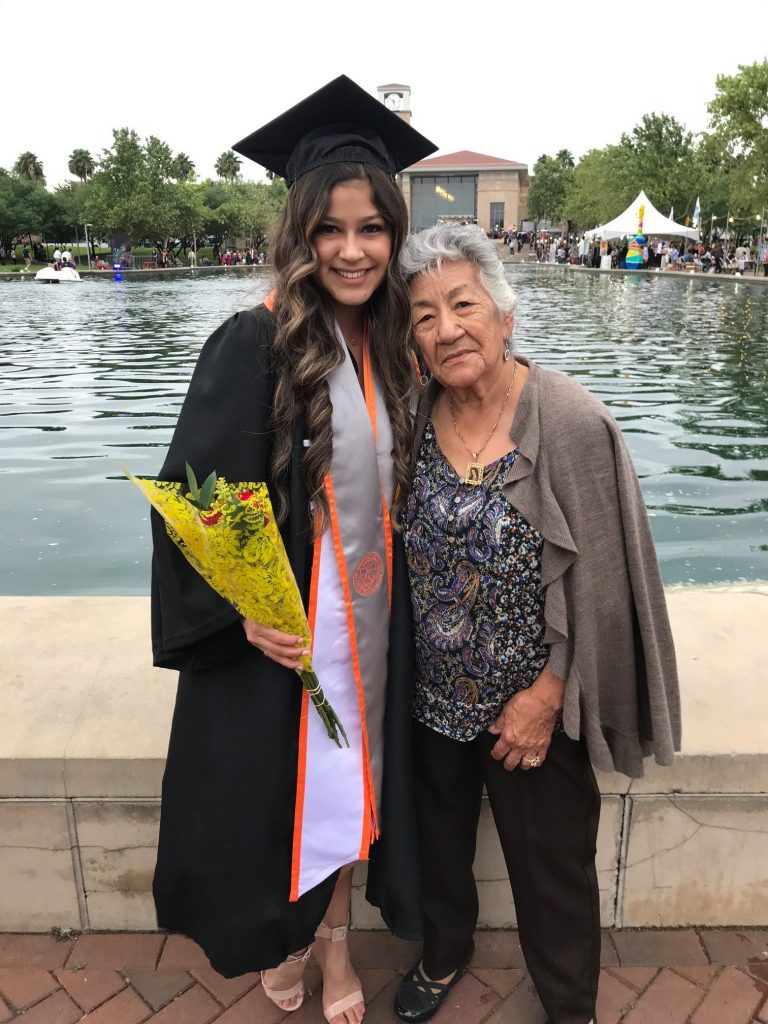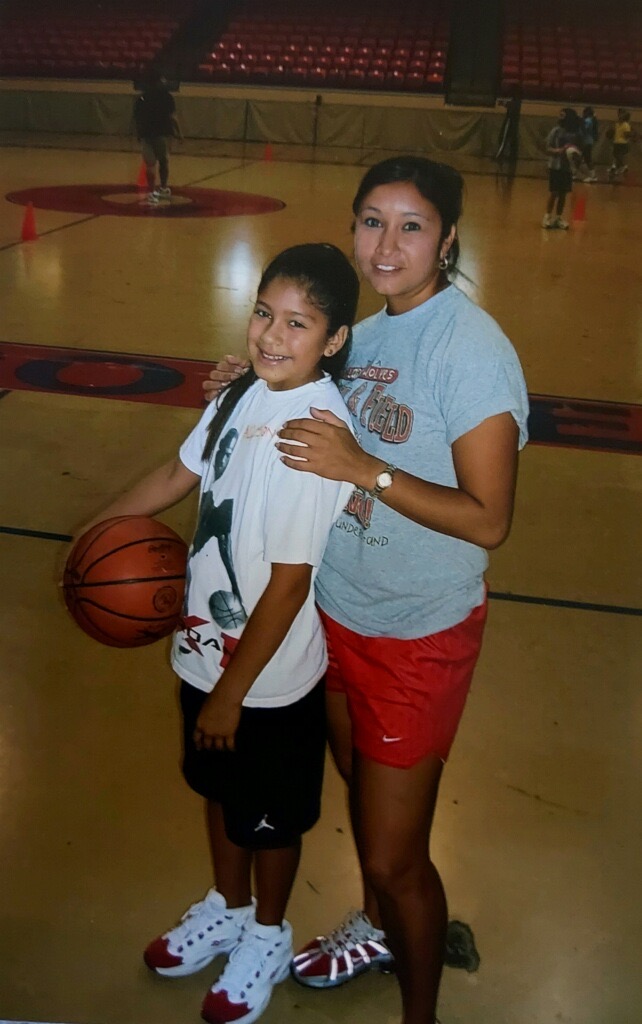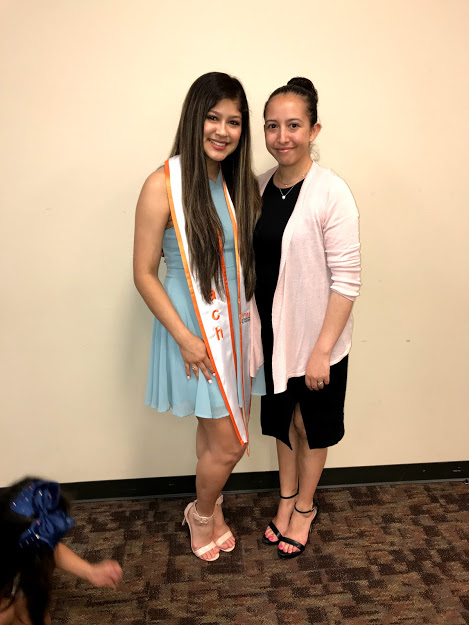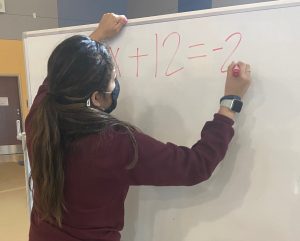
When I was younger, I was that older sister who voluntold their siblings to play ‘school’. I remember my sister asking to play the ‘teacher’ role, but I wouldn’t let her. I always wanted to be the one giving the lessons.
We laugh about it now and say they were the first ones to get a glimpse of my future. My mom worked multiple jobs because my dad wasn’t in the picture full time, so as the oldest, I tried to make sure my siblings were always on track with their schoolwork and felt protected.
Our small town of Colorado City, Texas was mostly family because my mom was one of 14 siblings, so when she was at work, we were at my grandma’s house or with my aunt. My grandma spoke mostly Spanish and I didn’t understand any, so communicating was not the easiest.
She would speak to me the most because my brother and sister were always tied to my hip and would only listen to me. Eventually, I picked up a few Spanish words from her but most of our conversations stayed communicated through our hand gestures, voice inflections, and actions.
She was our prayer warrior – that woman was always praying – and the reason we had school supplies and Christmas presents when my mom couldn’t afford them. Leaving her and my siblings when I went off to college was one of the hardest things I’ve ever done.

My aunt was my hero growing up. She was a teacher for six years and the first person in our big family to go to college. She was also my first basketball coach, so I got to see her in action in the classroom and on the court. I remember messing up practice drills and game shots so many times my first year playing, but she would never make me feel bad. Instead, she taught me that practice makes you better. That’s the kind of teacher she was, too. Always motivating her students to achieve their best.
When I was in 7th grade, she got engaged and moved away. We spent so much time together up until that year, and when she left, I felt like a part of me left as well. My junior year of high school, I started the college application process and I remember my school counselors asking us to bring our parent’s financial documents to school so we could fill them out together and correctly.
All my classmates would come prepared, but I never did. My mom had no clue about the process, so my aunt would help me fill out the forms over the phone. She was living in San Antonio at the time but then she moved to the Valley my senior year, so I decided to apply to and attend UTRGV to be closer to her.
College was so different from growing up in a small town, and I struggled to find ‘my’ group of people on campus and got really homesick. I thought about transferring to a college closer to home, but my aunt kept encouraging me to stick it out.
In my final year of student teaching, I remember something my aunt said that kept me going during that brutal last semester and still keeps me going on a hard day — it’s not how many times you get knocked down that matters, it’s how many times you get back up. Keep your head up and push forward for your students!

I always knew I was destined for the classroom since my teacher role-playing days in elementary, but I was never 100% sure what subject I wanted to teach until my senior year of high school. I had been a numbers person my entire life, but my freshman geometry and senior calculus teacher, Ms. Warren, stamped my passion for numbers and made them come to life that final year.
By the time my student teaching started in college, I was determined to inspire one student to become a math teacher like Ms. Warren did for me. I remember the first lesson I ever gave was to a classroom full of third graders. They were so much fun and never even noticed that my lesson was out of order.
I was able to observe or teach most grade levels after that experience and was eventually matched with the best mentor teacher who helped me realize I had what it took to impact student lives like I hoped I would. The only thing I wasn’t sure about was which grade level I wanted teach.
Closer to my graduation in 2019, an IDEA recruiter came to talk to our class about its academic results and the many opportunities it had for new teachers like me. I wanted to apply but also knew I wanted to move closer to home.
As soon as I found out IDEA was opening new schools in Tarrant County, I applied for a 7th grade permanent substitute position and was hired on right before the pandemic hit and jeopardized my first job in the classroom.
 I remember noticing George my first day teaching. He was super tiny and sitting in the last row of desks with a puzzled look on his face. He had just moved to the Tarrant County area from Mexico and spoke no English. I felt awful and didn’t know if I’d be able to communicate well enough for him to understand the lessons – I didn’t know much Spanish, but I was determined to get him on track.
I remember noticing George my first day teaching. He was super tiny and sitting in the last row of desks with a puzzled look on his face. He had just moved to the Tarrant County area from Mexico and spoke no English. I felt awful and didn’t know if I’d be able to communicate well enough for him to understand the lessons – I didn’t know much Spanish, but I was determined to get him on track.
The next day, unplanned, George and I figured out a process that helped remove some of our language barriers. After I explained the lesson to the other students, I’d walk over to his desk with a piece of paper and pencil in my hand, and we’d go through a problem step by step – me writing it out on paper and pointing to what I wanted him to copy. He’d smile back and match my step on his paper.
When I couldn’t communicate something through pointing or numbers, I’d use Google translate. Sometimes I’d say something wrong in Spanish, and he’d giggle at me with an endearing smile and try his best to make sense of my words. There were times I could feel his frustration. But we never gave up. We kept this up for weeks until I went over to George’s desk one day and realized — he had written out the problem all on his own. With the right answer circled underneath his work. I’ll never forget that ear-to-ear smile splashed across his face while I held my thumb up for him to see. I was so proud of him and wished so badly we both spoke the same language in that moment. But the universal language of numbers sitting on his paper was enough for both of us.
It’s those magical occurrences I miss most about having all my students in-person. They still happen virtually, but their impact is limited to one side of the screen. I know having that physical affirmation makes a huge difference to students, so when the school year wraps at the end of May, I will transition to teaching summer school for those students, like George, who need that extra bit of help to get back on track.